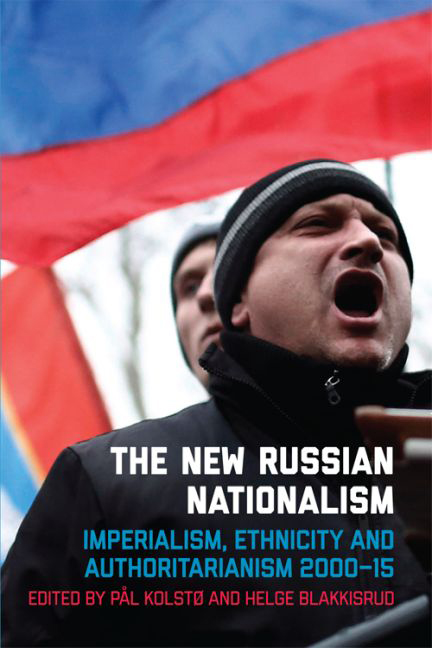Book contents
- Frontmatter
- Contents
- List of Figures
- List of Tables
- Acknowledgements
- Notes on Contributors
- Introduction: Russian nationalism is back – but precisely what does that mean?
- 1 The ethnification of Russian nationalism
- 2 The imperial syndrome and its influence on Russian nationalism
- 3 Radical nationalists from the start of Medvedev's presidency to the war in Donbas: True till death?
- 4 Russian ethnic nationalism and religion today
- 5 Everyday nationalism in Russia in European context: Moscow residents’ perceptions of ethnic minority migrants and migration
- 6 Backing the USSR 2.0: Russia's ethnic minorities and expansionist ethnic Russian nationalism
- 7 Rallying ’round the leader more than the flag: Changes in Russian nationalist public opinion 2013–14
- 8 How nationalism and machine politics mix in Russia
- 9 Blurring the boundary between civic and ethnic: The Kremlin's new approach to national identity under Putin's third term
- 10 Russia as an anti-liberal European civilisation
- 11 Ethnicity and nationhood on Russian state-aligned television: Contextualising geopolitical crisis
- 12 The place of economics in Russian national identity debates
- Bibliography
- Index
Introduction: Russian nationalism is back – but precisely what does that mean?
- Frontmatter
- Contents
- List of Figures
- List of Tables
- Acknowledgements
- Notes on Contributors
- Introduction: Russian nationalism is back – but precisely what does that mean?
- 1 The ethnification of Russian nationalism
- 2 The imperial syndrome and its influence on Russian nationalism
- 3 Radical nationalists from the start of Medvedev's presidency to the war in Donbas: True till death?
- 4 Russian ethnic nationalism and religion today
- 5 Everyday nationalism in Russia in European context: Moscow residents’ perceptions of ethnic minority migrants and migration
- 6 Backing the USSR 2.0: Russia's ethnic minorities and expansionist ethnic Russian nationalism
- 7 Rallying ’round the leader more than the flag: Changes in Russian nationalist public opinion 2013–14
- 8 How nationalism and machine politics mix in Russia
- 9 Blurring the boundary between civic and ethnic: The Kremlin's new approach to national identity under Putin's third term
- 10 Russia as an anti-liberal European civilisation
- 11 Ethnicity and nationhood on Russian state-aligned television: Contextualising geopolitical crisis
- 12 The place of economics in Russian national identity debates
- Bibliography
- Index
Summary
Nationalism is featuring increasingly in Russian society and in public discourse. Previously dominated by ‘imperial’ tendencies – pride in a large, strong and multi-ethnic state able to project its influence abroad – Russian nationalism is now focusing more and more on ethnic issues. This new ethnonationalism comes in various guises – as racism and xenophobia, but also as a new intellectual movement of ‘national democracy’ that deliberately seeks to emulate conservative West European nationalism.
Western media often fail to grasp the important differences between the various strands of Russian nationalism. Traditionally, Russian nationalists have focused on the perceived need to maintain a large and strong state, and have been far less concerned with ethnic interests and racial purity. These nationalists are usually referred to as ‘statists’ (gosudarstvenniki) or with the more derogatory term ‘imperialists’ (impertsy). Opposed to them are ethnonationalists who fight for the interests not so much of the Russian state but of the Russian people, ethnically defined. These two groups distrust, even hate, each other in their pursuit of opposing political goals.
Achieving ethnic and cultural homogeneity will be impossible as long as Russia remains a huge multi-cultural state with a hegemonic position in the post-Soviet space. A consequence of Vladimir Putin's drive to maintain a high degree of influence in the Central Asian and Caucasian post-Soviet states has been his willingness to keep Russian borders open to labour migration from these regions. To be sure, also in the Soviet period there was significant movement of people between the various parts of the USSR, but the setting has now changed radically. Gone is the overarching common Soviet culture; knowledge of the Russian language among the non-Russians in the other post-Soviet states is dwindling; and the immigrants who now arrive in Moscow and other large Russian cities often have little or no education and establish themselves as a poorly integrated Lumpenproletariat.
- Type
- Chapter
- Information
- The New Russian NationalismImperialism, Ethnicity and Authoritarianism 2000–2015, pp. 1 - 17Publisher: Edinburgh University PressPrint publication year: 2016



